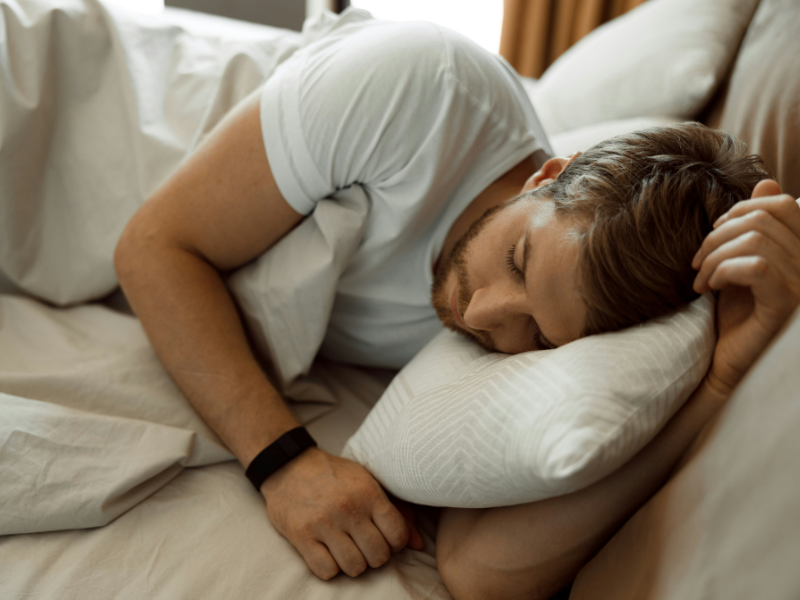你是否每天早上都在跟鬧鐘搏鬥?明明設了好幾個鬧鐘,卻總是賴床不想起來?其實,早起並不一定要痛苦,只要掌握正確的方法,你也可以輕鬆實現無痛早起的目標!
改善早上起不來方法一:巧妙使用鬧鐘
選擇一個柔和漸強的鬧鈴,讓自己能夠慢慢甦醒。將鬧鐘放在離床較遠的地方,迫使自己必須起身關掉鬧鐘。避免設置多個鬧鐘或使用貪睡功能,這只會干擾你的睡眠週期並增加起床困難。
改善早上起不來方法二:10 秒法則
鬧鐘響起後,給自己倒數 10 秒鐘倒數,然後果斷離開床鋪。不要躺在床上思考或檢查手機,這只會讓你更想繼續睡。起床後立即離開臥室,去浴室洗臉等等,避免再回到舒適的被窩中。
改善早上起不來方法三:接觸陽光
光線是最好的鬧鐘。走到窗邊,或者到戶外曬曬太陽。陽光能夠抑制褪黑激素的分泌,同時促進血清素的產生,有助於調節生理時鐘,讓你更快清醒並提升心情。
如果房間沒有自然光,市面上也有許多喚醒燈,可以定時漸漸亮起,打造陽光照進室內的效果。

改善早上起不來方法四:來杯溫水
睡前倒一杯溫水在床頭,早上醒來就可以快速補充睡眠時流失的水分,同時刺激腸胃蠕動,幫助身體甦醒。這個簡單的習慣能夠有效啟動新陳代謝,讓你更快進入狀態。
改善早上起不來方法五:做些簡單運動
輕度運動能幫助血液循環,讓身體更快甦醒。做幾個簡單的伸展動作,或原地跳躍30秒,就能有效提升能量。如果時間允許,晨跑或瑜伽都是不錯的選擇。運動還能刺激腦內啡的分泌,讓你感到愉悅和精力充沛。
改善早上起不來方法六:準備令人期待的晨間活動
最重要的是,給自己一些起床的動力!
腦科學家發現,起床後第一個念頭若是「今天也是美好的一天!」,會比「不想上班」等負面念頭更令人有活力,大腦也更健康。
可以準備美味的早餐,或規劃些有趣的晨間活動,讓自己期待早起。比如聽喜歡的 Podcast、閱讀激勵人心的書籍、靜坐冥想等。漸漸地,你會發現早起其實很棒,能夠擁有寧靜美好的早晨時光,以及更高的生產力。

想要神清氣爽起床,前提是要睡得好
其實早上起不來,便是說明你的身體並沒有得到足夠的休息。在疲憊的情況下,想靠著意志力或設十個鬧鐘早起,只會讓身心更加倦怠無力。而高品質睡眠可以透過以下方法循序漸進培養,有效補足精神:
提升睡眠品質方法一:善用90分鐘睡眠週期 找出最佳睡眠時長
每個人的睡眠需求不同,而成人一般需要約 6 到 9 小時的睡眠時間。可以利用智慧型手錶或手機APP追蹤自己的睡眠狀況,知道自己需要多少睡眠時間後,就能合理安排睡眠計畫。
此外,一個睡眠週期約為 90 分鐘,其中經過淺、中、深睡、快速眼動期(REM)等四個階段。若是在深睡時被強制喚醒,會感到更加疲倦、頭昏腦脹,容易產生起床氣,也就所謂的「睡眠慣性」(Sleep Inertia)。
因此建議以 90 分鐘的倍數為總睡眠時長,然後從目標起床時間回推就寢時間。
舉例來說:
A發現自己平均得睡 7 小時以上才會睡飽,而每天需在 8 點起床上班,那他最佳的睡眠時間就是晚上 11:00 (睡 9 小時)或是 00:30 (睡 7.5 小時)。
提升睡眠品質方法二:建立固定的睡眠時間
每天盡量在固定的時間睡覺和起床,這樣可以調整生理時鐘,讓身體習慣在特定時間入睡和醒來。專家表示,在週末大睡特睡並不能有效補眠,甚至還會產生社會性時差,令人更加疲憊。
提升睡眠品質方法三:養成睡前放鬆習慣
睡前1-2小時開始進行放鬆活動,幫助身心從一整天的工作模式切換到睡眠狀態。可以泡個熱水澡、做些輕柔的伸展運動、聽輕音樂、閱讀、冥想等。
許多心理師也推薦在睡前書寫,紀錄每天感恩的事情,寫下煩惱或是明天要做的事,可以有效幫助清空思緒、降低焦慮,在放鬆的心情下入眠。
不管你的睡前儀式為何,重點是避免使用手機電腦等電子產品,因為螢幕發出的藍光會干擾褪黑激素分泌,影響睡眠。

提升睡眠品質方法四:限制咖啡因攝取、補充助眠營養素
咖啡因會刺激中樞神經系統,影響睡眠品質。盡量在下午3點後避免攝取含咖啡因的飲品,如咖啡、茶、可樂等。
可以選擇無咖啡因的替代品,如香蜂草茶或溫燕麥奶。
研究表明,香蜂草能促進體內 GABA 的功效,可以幫助緩解壓力、促進放鬆,改善失眠症狀。而燕麥奶則富含褪黑激素、鋅等助眠營養素。
此外,酒精雖然會令人愛睏,卻會破壞睡眠品質。晚餐小酌,不妨選擇無酒精調酒,或添加香蜂草、GABA、和色胺酸的 Wave 放鬆氣泡飲,無負擔又能養成好眠體質。
養成新習慣需要時間和耐心。不要因為一兩天的失敗就放棄,持之以恆才是關鍵。相信只要堅持這些方法,你一定能夠擺脫起床困難,輕鬆實現無痛早起!

Trouble Waking Up? Headaches and Dizziness in the Morning? 10 Practical Tips for Painless Early Rising
Do you find yourself battling with your alarm clock every morning? Setting multiple alarms but still struggling to get out of bed? The truth is, waking up early doesn't have to be painful. With the right methods, you too can achieve the goal of painless early rising!
Tip 1: Use Your Alarm Clock Wisely
Choose an alarm with a gentle, gradually increasing sound to wake you up slowly. Place your alarm clock far from your bed, forcing you to get up to turn it off. Avoid setting multiple alarms or using the snooze function, as these can disrupt your sleep cycle and make it harder to wake up.
Tip 2: The 10-Second Rule
When your alarm goes off, count down from 10, then decisively get out of bed. Don't lie in bed thinking or checking your phone, as this will only make you want to sleep more. Leave your bedroom immediately after getting up, perhaps to wash your face in the bathroom, avoiding the temptation to return to your cozy bed.
Tip 3: Exposure to Light
Light is nature's best alarm clock. Go to a window or step outside for some sunlight. Sunlight suppresses melatonin production while promoting serotonin, helping to regulate your body clock, wake you up faster, and improve your mood.
If your room lacks natural light, consider using a wake-up light that gradually brightens, simulating sunrise in your room.

Tip 4: Drink Warm Water
Place a glass of warm water by your bedside before sleep. Drinking it immediately upon waking quickly replenishes fluids lost during sleep and stimulates your digestive system, helping your body wake up. This simple habit can effectively kickstart your metabolism, helping you get into gear faster.
Tip 5: Do Some Light Exercise
Light exercise helps improve blood circulation, waking your body up faster. Do a few simple stretches or jump in place for 30 seconds to boost your energy. If time allows, a morning jog or yoga session are excellent choices. Exercise also stimulates endorphin production, making you feel happy and energetic.
Tip 6: Plan Exciting Morning Activities
Most importantly, give yourself a reason to get up!
Neuroscientists have found that if your first thought upon waking is "Today is going to be a great day!" rather than negative thoughts like "I don't want to go to work," you'll feel more energized and it's healthier for your brain.
Prepare a delicious breakfast or plan some interesting morning activities to look forward to. This could be listening to your favorite podcast, reading an inspiring book, or practicing meditation. Gradually, you'll find that waking up early is actually great, allowing you to enjoy peaceful morning hours and increased productivity.

To Wake Up Refreshed, You Need to Sleep Well First
If you're having trouble waking up in the morning, it's likely because your body hasn't gotten enough rest. Trying to wake up early when you're exhausted, relying on willpower or multiple alarms, will only make you feel more tired and weak. High-quality sleep can be cultivated through the following methods, effectively replenishing your energy:
Sleep Quality Tip 1: Utilize the 90-Minute Sleep Cycle to Find Your Ideal Sleep Duration
Sleep needs vary from person to person, with adults generally requiring about 6 to 9 hours of sleep. Use a smartwatch or phone app to track your sleep patterns and determine how much sleep you need, allowing you to plan your sleep schedule accordingly.
A sleep cycle lasts about 90 minutes, during which you go through light, medium, deep sleep, and REM (Rapid Eye Movement) stages. If you're forcibly awakened during deep sleep, you'll feel more tired and groggy, likely to experience "sleep inertia."
Therefore, it's recommended to aim for sleep durations in multiples of 90 minutes, then work backwards from your target wake-up time to determine your bedtime.
For example:
If you find you need at least 7 hours of sleep to feel rested and need to wake up at 8 AM for work, your ideal bedtimes would be either 11 PM (for 9 hours of sleep) or 12:30 AM (for 7.5 hours of sleep).
Sleep Quality Tip 2: Establish a Consistent Sleep Schedule
Try to go to sleep and wake up at the same time every day, including weekends. This helps adjust your body clock, making it easier for your body to naturally fall asleep and wake up at specific times. Experts say that oversleeping on weekends doesn't effectively make up for lost sleep and can even create a "social jet lag", making you feel more tired.
Extended Reading: Weekend Oversleeping Won't Help! 7 Surprising Truths About Sleep Debt
Sleep Quality Tip 3: Develop a Relaxing Bedtime Routine
Start relaxing activities 1-2 hours before bedtime to help your mind and body transition from work mode to sleep mode. This could include taking a warm bath, doing gentle stretches, listening to soft music, reading, or meditating.
Many psychologists also recommend writing before bed. Keeping a gratitude journal, writing down your worries, or listing tasks for the next day can effectively help clear your mind, reduce anxiety, and allow you to sleep in a relaxed state of mind.
Whatever your bedtime ritual, the key is to avoid using electronic devices like phones or computers, as the blue light emitted from screens can interfere with melatonin production and affect sleep.

Sleep Quality Tip 4: Limit Caffeine Intake and Supplement with Sleep-Promoting Nutrients
Caffeine stimulates the central nervous system and can affect sleep quality. Try to avoid caffeinated drinks like coffee, tea, and cola after 3 PM.
Choose caffeine-free alternatives like lemon balm tea or warm oat milk.
Studies show that lemon balm can enhance the effects of GABA in the body, helping to relieve stress, promote relaxation, and improve insomnia symptoms. Oat milk is rich in sleep-promoting nutrients like melatonin and zinc.
Additionally, while alcohol might make you drowsy, it can disrupt sleep quality. For evening drinks, consider non-alcoholic cocktails or relaxation beverages containing lemon balm, GABA, and tryptophan, like Wave Relaxation Drink, which can help you develop good sleep habits without the negative effects.
Remember, forming new habits takes time and patience. Don't give up because of one or two days of failure; persistence is key. Believe that by sticking to these methods, you'll definitely overcome the difficulty of waking up and achieve painless early rising!



